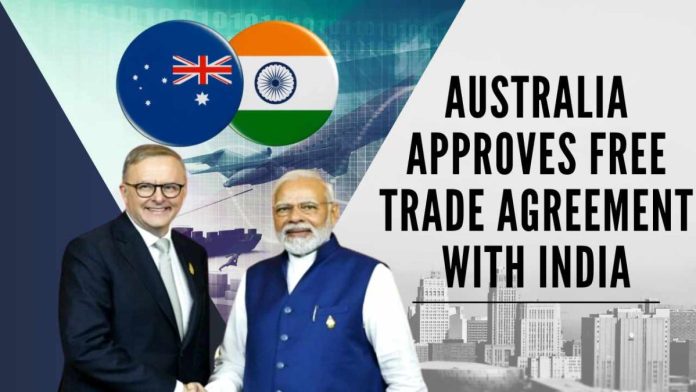While reducing the dependency of both countries on Chinese products, the Australian parliament today ratified the Australia-India Economic Cooperation and Trade Agreement (AI-ECTA). This strengthens further the already growing strategic relationship, with Australian Prime Minister Anthony Albanese, who is slated to visit India in March 2023, making the announcement today through a tweet where he tagged his Indian counterpart, Narendra Modi.
India and Australia carry out joint military exercises now, the most comprehensive being the Malabar Exercise. Both are also partners in Quad along with the US and Japan.
A whole lot of deals for India
The AI-ECTA is an initial trade agreement that is meant to culminate into a much larger deal — the Comprehensive Economic Cooperation Agreement (CECA), which is under negotiation. Under the AI-ECTA, to be enforced by December, India hopes to tap Australia’s vast and rich mineral resources, enabling it to reduce dependence on China, top official sources say. They said India could now import coking coal and uranium from Australia on zero duty. New Delhi wants to enhance services trade between both the “complimentary economies”, the sources said.
India is looking forward to the AI-ECTA signed in April 2022 that CECA to get integrated with the trading network and supply chains of the mega trade pact, the Regional Comprehensive Economic Partnership (RCEP), which began its journey earlier this year. The RCEP is a free trade agreement among 14 countries — Australia, New Zealand, Brunei Darussalam, Cambodia, China, Japan, Laos, Singapore, Thailand, Vietnam, South Korea, Malaysia, Myanmar and the Philippines.
India had quit the RCEP in November 2019 due to China. In November 2020, the government calculated that New Delhi had the choice to join the pact in the future.
India now has free trade agreements (FTA) with almost all RCEP members except China and New Zealand. “While the RCEP is definitely a much deeper, high-ambitious trade agreement, India has certainly been able to create a dent in that network,” said an official privy to the talks.
Though the CECA talks between India and Australia began in 2011, it remained stuck for years until both countries came closer while their joint acrimony against China pushed them to this strategic unity.
Under the ECTA, two-way trade between India and Australia is expected to reach $ 45-50 billion in five years from $ 31 billion currently, according to an estimate by the Ministry of Commerce and Industry.
What is in it for India?
In July, Coal and Mines Minister Pralhad Joshi had visited Australia to procure “commercially viable strategic critical minerals” from that country. The union minister had visited the mineral-rich sites of Tianqi Lithium Kwinana and Greenbushes Mine. Besides, the source said, India is looking at gaining major market access in services exports for its large population of IT professionals.
This FTA will also benefit Indian students studying in Australia with flexible working visas, Minister of Commerce and Industry Piyush Goyal told reporters today.
“With the UAE and Australia (trade pacts), every sector is happy. Every sector has supported this… And the IT sector is the biggest gainer. So, it also reflects that the services play an important and intrinsic role in free trade agreements,” Goyal said.
The union minister said that the ECTA had the potential to create 10 lakh jobs in India.
FTA galore
This is the second such trade pact that the Modi government has brought to reality. The Modi government, which the socialist opposition, as well as RSS’s own Swadeshi Jagran Manch, used to pressure to denounce FTA earlier, forcing it to opt for more liberalisation of the foreign direct investments instead, believes that it is signing such deals now without glitches, unlike what the UPA dispensation could manage.
According to Union Minister Goyal, both FTA signed under the present government with the UAE and now with Australia have the “unanimous support” of all stakeholders.
According to a statement issued by Australia, the agreement “will eliminate tariffs on over 90% of Australian goods exports to India by value. India’s high tariffs on agriculture, such as sheepmeat, wool, cotton, seafood, macadamia nuts and avocados will be removed, with the vast majority, or 85%, eliminated from the day ECTA enters into force. India will also substantially reduce its 150% tariff on bottled wine above $ 5.”
Australia expands export market
Australia today also ratified a trade pact with the UK. Both these pacts will now enable the Albanese government to diversify its exports to a wider market for minerals, steel and agricultural goods and not continue haggling with China. “New trade agreements with India and the UK will strengthen our existing trade and economic relationships. These new agreements will create new opportunities for trade diversification and great outcomes for Australian business and families,” Prime Minister Albanese said today.
“Today’s passage of legislation demonstrates Australia’s commitment to free trade and the rules-based trading system. It is an acknowledgement of the centrality of trade to our economic resilience and ongoing prosperity,” the Australian prime minister said.
With the passage of the AI-ECTA through both houses of the Australian parliament, the country’s Trade Minister Don Farrell said that exporters, businesses, workers and consumers would soon be able “to reap the opportunities and benefits of more open trade” with India and the UK.
“ECTA presents exciting opportunities for Australian and Indian businesses alike, paving the way for improved market access for businesses on both sides of the Indian Ocean. I am now looking forward to the second innings: negotiation of a full Comprehensive Economic Cooperation Agreement,” said Barry O’Farrell, High Commissioner of Australia to India.





You must log in to post a comment.